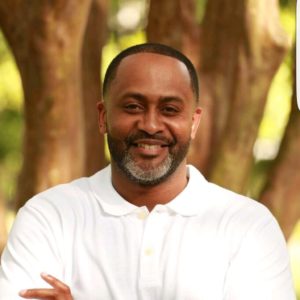
by Rev. Earle J. Fisher (Originally published on MLK50.com)
Wow. CNN political commentator Angela Rye’s fiery pronouncement of the state of the affairs in Memphis since 1968 sent shockwaves throughout Shelby County and throughout social media. Rye mounted The Orpheum Theatre stage, played an excerpt from Dr. King’s “Mountaintop” speech and challenged Memphis to live more fully into the ideals King espoused before he expired.
Rye said, “Revisionist history is what makes us love Dr. King. It’s the pulling of the quotes that are the easiest to digest. It’s the harsh truth of his word. And I’m crying from frustration because we can do better as a people. We must do better as a people. Our lives are literally on the line.”
Then she put her money where her mouth is, pledging $5,000 each to the C-3 Land Cooperative and the Official Black Lives Matter Memphis Chapter. Rye also challenged city officials and citizens to follow suit.
You. Go. Girl! We should affirm and tangibly support organizations like these.
Although a group of activists (of which I was a part) met with Rye prior to the speech Feb. 24, we did not foresee the depth of passion and prophetic utterance she put on display.
Rye’s presentation has been met with mixed reviews. Fact checks were published. Memphis’ mayor, who hosted the event, stated he didn’t know who Rye was and dismissed her as a conventional “outside agitator.” The City of Memphis communication chief called Rye’s remarks “classless.” Some moderates said Rye was honest but did not honor the sanctity of the event nor the generosity of the city’s honorarium. Meanwhile, grassroots activists and organizers across the country have offered a chorus of amens to Rye’s words.
Was Rye out of order? It depends on how much our city and country values the truth. And truth, in our current political climate, seems to be bound by political correctness … depending on who is delivering it.

Inconvenient truths
Following the recent tragedy of gun violence that befell students in Parkland, Florida students, parents, activists and even some politicians began to speak out, chastising the complacent U.S. Congress for a lack of progressive gun-control policies. Their truth, no matter how abrasive in content, seems to be affirmed writ large. And rightfully so. The realities of their pain and trauma validates their righteous indignation.
All rhetoric is contextual. Yet, the truth is uncompromising (and often inconvenient).
What might be the difference between comments made by Angela Rye and those made by Stoneman Douglas High School students? Are the ailments highlighted by Rye any less pressing and in need of progressive policy support than those in Parkland? Or, is truth more readily received in our current climate when it comes from white students as opposed to black “sistaz”?
There are some substantive observations that must be made in this moment that will determine how much systemic progress can be made leading up to and immediately following the 50th commemoration of Dr. King’s assassination on April 4. Our responses will dictate whether we lean more into chaos or further into community.
Leaning further into community and further away from chaos demands we depoliticize the truth. Whether it comes from inside or outside …
“Chaos or community” are words that comprise the subtitle to King’s last book “Where Do We Go From Here: Chaos or Community?” These words continue to confront us 50 years after his assassination in Memphis. According to a recent Economic Policy Institute report, little to no significant and structural progress has been made for African-Americans. The article reveals, “7.5 percent of African-Americans were unemployed in 2016 compared with 67 percent in 1968 — still roughly twice the white unemployment rate.” A poverty report released by the National Civil Rights Museum expresses the same sentiment, highlighting the “median income for African-Americans has stubbornly remained at approximately 50 percent of income for whites for the past half century.”
I feel like I heard someone make a similar pronouncement recently. Right?
Leaning further into community and further away from chaos demands we depoliticize the truth. Whether it comes from inside or outside, white children or black women, elected officials or community activists, parades or banquets, pulpits or blogs, we should honor and embrace the truth.
The truth often hurts
Let us not be deceived by ceremonial language. Let’s not be lulled to sleep by political correctness and incrementalism. In 1968, Mayor Henry Loeb presented a public face of Memphis to the nation that all was well. Loeb, a known segregationist, was quoted saying Memphis, “didn’t have a race problem” and “black folks in Memphis were content — and would remain so, as long as Northern agitators didn’t come down and stir things up.” Sound familiar?
King cautioned us not to be deceived by “an illusion wrapped in superficiality” becoming “victims of an optimism which makes for deadening complacency and stagnant passivity.”
Sanitation workers begged to differ in 1968. Those of us on the front line of the struggle are begging to differ in 2018. King cautioned us not to be deceived by “an illusion wrapped in superficiality” becoming “victims of an optimism which makes for deadening complacency and stagnant passivity.”
In that same vein, Rye warned us, “Don’t just stay woke. Work woke!”
So, let’s be honest: What Rye stated from the Orpheum podium was factual, truthful and painful. Criticisms surrounding her remarks are rooted in allegiance and affiliation much more than accuracy. If you’ve been deeply involved in volunteerism and advocacy work for the past several years, if you are directly subject to the poverty, pain and political surveillance that plagues the city, you understand what King called the “fierce urgency of now.” To which Rye challenged us to respond. If you are part of the 11 percent of registered voters who elected the current administration (the mayor won 41 percent of the vote but only 28 percent of registered voters turned out), then you likely prefer a more palatable serving of half-truths. If you are directly reaping the benefits of modest measures made at City Hall to ensure economic development in Midtown and Downtown, while allowing economic disparities in Brown Town and Box Town, then you probably would insist Angela Rye delivered “fake news.”
Take Rye as a challenge, not an insult
Ironically, Rye never directly mentioned the only one who took her comments personally — the mayor. Rye used the word “Memphis” approximately 20 times in her speech. The word “mayor” shows up — zero. Rye’s comments were directed at the city of Memphis. She stated, “I say to you “Memphis, be true to what you said on paper…You can do this, Memphis.”
Memphis! I’m a part of that group. City Councilman Martavius Jones is in the number. Jones said he chose to take Rye’s words as a challenged to our city and not an insult. State Rep. G.A. Hardaway said, “The observations by Angela Rye and the ensuing discussions could very well serve as a valuable educational opportunity for the City and the monied corporations of Memphis/Shelby County.”
The bottom line is this: Angela Rye, a respected political analyst and attorney, put her money where her mouth is. She challenged us to support and uplift groups doing the work to offset the lack of structural and systemic progress we’ve made in the past 50 years. What would the community look like if city officials, church leadership, community organizations and people of goodwill were not politicizing the truth but prioritizing the task of meaningful, structural and systemic progress?
We can choose community over chaos. As Rye said, “The choice is on (us).”
(The Rev. Earle J. Fisher is pastor of Abysinnian Missionary Baptist Church, organizer of the Memphis/Shelby County Voter Collaborative, a nonpartisan initiative to increase voter turnout, and a key player in the successful #TakeEmDown901 movement.)




